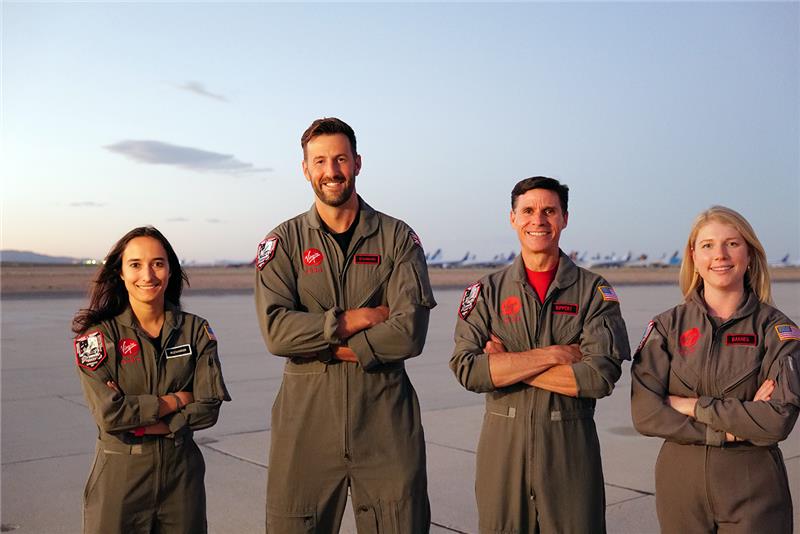
On the upper deck of a Virgin Orbit 747-400, Dayle Alexander prepared for launch. In the utilitarian cabin stripped of its usual first-class luxuries, she monitored a computer console with rocket and aircraft telemetry. She knew the procedures. She was ready to handle any anomalies.
It was almost four years after she first started at Virgin Orbit, and she was living a dream: Alexander and her fellow launch engineer Sarah Barnes were responsible for the safe and effective deployment of the LauncherOne rocket.
On July 1, 2022, after completing the first cold pass, the aircraft approached the drop point a second time. They initiated the launch sequence. Once the engines were chilled and ready, clamps released it from underneath the 747’s left wing, and as the pilots pulled up and banked away, the rocket ignited.
With Alexander on the flight crew, Virgin Orbit’s Straight Up mission successfully sent seven United States Space Force satellites into Earth’s orbit.
This job on the flight crew is a departure from Alexander’s original plan at Virgin Orbit. After completing her aeronautics and astronautics bachelor’s degree in 2016 and her and master’s in 2018, she started work doing exactly what she intended: designing rocket engines.

She said that doing her master’s thesis research with Stephen Heister, the Raisbeck Engineering Distinguished Professor of Engineering, in Purdue’s Maurice J. Zucrow Laboratories gave her an advantage in vying for the position.
"There are several Zucrow alumni at Virgin Orbit. Having Zucrow on my resume, and having people looking at it who knew what Zucrow was, that helped out a lot," she says. "I got to be heavily involved with some combustion device design and analysis and it was really, really cool."
But a different desire lit up in 2020, when she saw Virgin Orbit’s first LauncherOne demonstration flight explode just seconds after ignition. Her work in engine design was right in her area of expertise — but in that moment, she felt like something was missing. She was missing.
"I saw the first one, the only failed mission, and I felt a little bit in the background," she said. "I wanted to be in the thick of the action, where all this new stuff was happening."
Alexander asked around about joining the flight crew, and she jumped at the position as soon as it was available.

The pilots and launch engineers are the only four people on the plane, so Alexander had to complete high altitude and water-landing survival training to fly. But the bulk of the work ahead of a launch consists of preparing the instruments and practicing a performance — a performance with explosive contents.
On the ground, Alexander is part of the general launch operations team. She’s participating in wet dress rehearsals, preparing software and auto-sequencers, and providing input on sensors and other details the launch sys tem may need. There’s additional practice on board the 747.
"We have tons of test flights before actual launch. I probably did six or seven training missions for both the pilots and the launch engineers," she said.

While the pilots are practicing the launch release maneuver, Alexander and Barnes are running through procedures, anomalies and mitigation processes. On launch day, the "Terminal Count" auto-sequencer is the critical time: Once completed, the rocket will launch, period.
"The Terminal Count lasts for about 15 minutes before the drop. Those minutes were the most intense of the mission, because that’s when the rocket is not just sitting there anymore. It’s doing work. Valves are opening, propellant is moving through the system. If something went wrong, that’s when it would probably happen," she says.
All that practice, knowing the routine, reminded her of a completely different Purdue experience. While she studied aerospace engineering, she also played the baritone with the "All-American" Marching Band for five seasons, and in indoor and pep bands like Gold and Black Sound, Boiler Brass and the Boiler Box Band.
"It felt a lot like something I had practiced for a bunch of times, and then was finally doing it for an audience," she said.
And though she only plays baritone when she joins the Purdue alumni band, practiced habits are hard to break: "I know I haven’t forgotten ‘Hail Purdue!’"

Left to right: launch engineer Dayle Alexander (BSAAE '16, MSAAE '18), pilot Mathew "Stanny" Stannard, pilot-in-command Eric "Bip" Bippert, and launch engineer Sarah Barnes made up the entire crew for Virgin Orbit's Straight Up mission